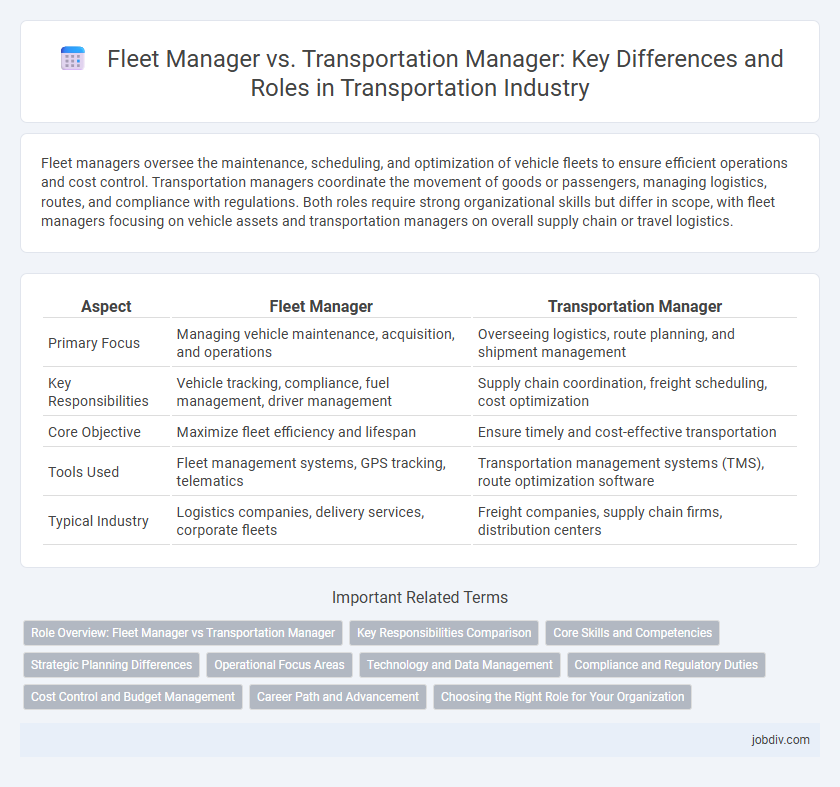Fleet managers oversee the maintenance, scheduling, and optimization of vehicle fleets to ensure efficient operations and cost control. Transportation managers coordinate the movement of goods or passengers, managing logistics, routes, and compliance with regulations. Both roles require strong organizational skills but differ in scope, with fleet managers focusing on vehicle assets and transportation managers on overall supply chain or travel logistics.
Table of Comparison
| Aspect | Fleet Manager | Transportation Manager |
|---|---|---|
| Primary Focus | Managing vehicle maintenance, acquisition, and operations | Overseeing logistics, route planning, and shipment management |
| Key Responsibilities | Vehicle tracking, compliance, fuel management, driver management | Supply chain coordination, freight scheduling, cost optimization |
| Core Objective | Maximize fleet efficiency and lifespan | Ensure timely and cost-effective transportation |
| Tools Used | Fleet management systems, GPS tracking, telematics | Transportation management systems (TMS), route optimization software |
| Typical Industry | Logistics companies, delivery services, corporate fleets | Freight companies, supply chain firms, distribution centers |
Role Overview: Fleet Manager vs Transportation Manager
Fleet Managers oversee vehicle acquisition, maintenance schedules, and compliance with safety regulations to ensure optimal fleet performance and cost efficiency. Transportation Managers coordinate logistics, route planning, and delivery schedules, focusing on the efficient movement of goods and personnel. Both roles require strong leadership and strategic planning but differ in scope, with Fleet Managers concentrating on vehicle assets and Transportation Managers managing overall transportation operations.
Key Responsibilities Comparison
Fleet managers oversee vehicle acquisition, maintenance, compliance, and driver management to ensure optimal fleet performance and cost efficiency. Transportation managers coordinate logistics operations, route planning, freight management, and regulatory adherence to streamline the movement of goods and services. Both roles require strategic planning and operational oversight, but fleet managers focus more on vehicle assets while transportation managers emphasize overall transport logistics.
Core Skills and Competencies
Fleet Managers excel in vehicle maintenance scheduling, cost control, and regulatory compliance, ensuring operational efficiency and asset longevity. Transportation Managers focus on logistics planning, route optimization, and supply chain coordination to enhance delivery performance and customer satisfaction. Both roles require strong leadership, analytical skills, and expertise in transportation software systems for effective management.
Strategic Planning Differences
Fleet Managers prioritize optimizing vehicle maintenance schedules, route efficiency, and cost control to ensure operational reliability. Transportation Managers concentrate on broader logistics strategy, including supply chain coordination, regulatory compliance, and overall network scalability. Strategic planning for Fleet Managers centers on asset lifecycle management, while Transportation Managers focus on aligning transportation policies with corporate goals.
Operational Focus Areas
Fleet Managers concentrate on vehicle maintenance, fuel management, and driver scheduling to optimize fleet performance and reduce operational costs. Transportation Managers oversee route planning, freight coordination, and compliance with transportation regulations to ensure timely and efficient delivery of goods. Both roles collaborate to enhance overall supply chain efficiency but with distinct operational focus areas.
Technology and Data Management
Fleet managers leverage GPS tracking systems, telematics, and fleet management software to optimize vehicle maintenance schedules, fuel consumption, and route efficiency. Transportation managers utilize advanced data analytics platforms and transportation management systems (TMS) to oversee logistics, shipment tracking, and freight cost control. Both roles rely heavily on real-time data integration but focus differently: fleet managers prioritize vehicle operational data, while transportation managers concentrate on broader supply chain and delivery metrics.
Compliance and Regulatory Duties
Fleet Managers oversee vehicle maintenance and ensure adherence to safety regulations, managing compliance with standards such as DOT and EPA. Transportation Managers coordinate logistics, ensuring that transportation operations comply with legal requirements including driver qualifications and hours of service regulations. Both roles require vigilance in regulatory updates to maintain operational legality and reduce risk of violations.
Cost Control and Budget Management
Fleet Managers specialize in optimizing vehicle maintenance schedules and fuel consumption to minimize operational costs, directly influencing cost control metrics. Transportation Managers oversee broader budget management, including route planning, carrier negotiations, and logistics technology investments, ensuring overall expenditure aligns with financial targets. Effective collaboration between both roles enhances cost efficiency by balancing asset utilization with strategic financial planning in transportation operations.
Career Path and Advancement
Fleet Managers specialize in overseeing vehicle maintenance, compliance, and logistics, typically progressing from roles in operations or vehicle coordination to senior fleet management positions. Transportation Managers focus on broader supply chain functions, including route planning, cost control, and team leadership, often advancing toward director-level roles in logistics or supply chain management. Career advancement for Fleet Managers centers on technical expertise and asset management, while Transportation Managers cultivate strategic planning and operational oversight skills for higher executive opportunities.
Choosing the Right Role for Your Organization
Fleet managers focus on the efficient operation and maintenance of vehicle fleets, ensuring cost-effective asset utilization and compliance with safety regulations. Transportation managers oversee broader logistics, including route planning, freight coordination, and supply chain integration to optimize delivery schedules and reduce transit times. Choosing the right role depends on whether your organization prioritizes hands-on vehicle management or strategic transportation planning for overall operational efficiency.
Fleet Manager vs Transportation Manager Infographic

 jobdiv.com
jobdiv.com